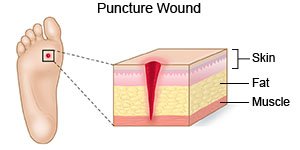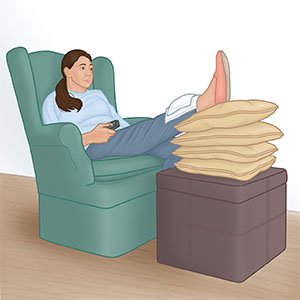Puncture Wound in the Foot
Medically reviewed by Drugs.com. Last updated on Apr 6, 2025.
AMBULATORY CARE:
A puncture wound
is a hole in the skin of your foot made by a sharp, pointed object. The area may be bruised or swollen. You may have bleeding, pain, or trouble moving the affected area.
 |
Signs and symptoms of puncture wounds may include
a bruised or swollen area. You may have bleeding, pain, or trouble moving the affected area.
Seek care immediately if:
- You have severe pain.
- You have numbness or tingling in the area of your wound.
- Your wound starts bleeding and does not stop, even after you apply pressure.
Call your doctor if:
- You have new drainage or a bad odor coming from the wound.
- You have a fever or chills.
- You have increased swelling, redness, or pain.
- You have red streaks on your skin coming from your wound.
- You have questions or concerns about your condition or care.
Medicines:
You may need any of the following:
- NSAIDs , such as ibuprofen, help decrease swelling, pain, and fever. This medicine is available with or without a doctor's order. NSAIDs can cause stomach bleeding or kidney problems in certain people. If you take blood thinner medicine, always ask your healthcare provider if NSAIDs are safe for you. Always read the medicine label and follow directions.
- Antibiotics help treat a bacterial infection.
- Take your medicine as directed. Contact your healthcare provider if you think your medicine is not helping or if you have side effects. Tell your provider if you are allergic to any medicine. Keep a list of the medicines, vitamins, and herbs you take. Include the amounts, and when and why you take them. Bring the list or the pill bottles to follow-up visits. Carry your medicine list with you in case of an emergency.
Care for your wound as directed:
Keep your wound clean and dry. When you are allowed to bathe, carefully wash the wound with soap and water. Dry the area and put on new, clean bandages as directed. Change your bandages when they get wet or dirty.
Rest and elevate
your foot above the level of your heart as often as you can. This will help decrease swelling and pain. Prop your foot on pillows or blankets to keep it elevated comfortably.
 |
Follow up with your doctor in 2 to 3 days:
Write down your questions so you remember to ask them during your visits.
© Copyright Merative 2025 Information is for End User's use only and may not be sold, redistributed or otherwise used for commercial purposes.
The above information is an educational aid only. It is not intended as medical advice for individual conditions or treatments. Talk to your doctor, nurse or pharmacist before following any medical regimen to see if it is safe and effective for you.
Learn more about Puncture Wound in the Foot
Care guides
Further information
Always consult your healthcare provider to ensure the information displayed on this page applies to your personal circumstances.
